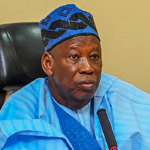Bookshelf: ‘Sunbeams and Shadows’ is your third collection of poetry. What triggered these poems, this concept of light and shade?
Sadiq Dzukogi: The trigger of the poems is as it is with all the poems I have written in the other collections, my imaginative voyage through the known and the unknown terrains of the body, mind and soul.In a bid to open the gates that will allow me stand at a luminous, between two worlds, the surreal and the real. The process of writing a poem that will endure is a delicate exercise, which seeks to give a voice to emotions, so that your readers will have a feel of what you have experienced. Poems are largely driven by personal experiences. But this particular collection was triggered by nature – I felt the surge of this energy, which yearned for me to communicate my love for the extra-terrestrial and even the terrestrial. ‘Sunbeams and Shadows,’ is a testament of that unwavering love. The concept of light and shade or rather light and darkness was simply to create a metaphor for life and death, happiness and sadness, love and hate, and the several other things on my left and right sides. The contrast was to create a parallel with real life situations that are of opposing energies, with each exerting a force that seeks to outdo the other.
Bookshelf: Do you feel that your development as a poet now has gone beyond your latter collections?
Dzukogi: Sure, I will love to think that. The responses I have been getting are warm so far, I only hope they are honest responses (laughs). But in truth I am not the one to asses my development, I am a writer, I have written, let the experts of assessment continue from there. Between the other two collections and this one, there are clear differences, I will like to believe. The other two were written by a teenager while this one is by a man. Yes, ‘Canvas’ was published in 2011, but the poems were written while I was in secondary school. ‘Canvas’ did well, since it became first runner-up in ANA Poetry Prize 2012, mind you that’s not a yardstick for judging success, prizes shouldn’t. A prize should be a reward or acknowledgement of success. If you haven’t won anything, they think you are not successful. I think the greatest prize a writer can get is followership. Yes, I want to win prizes, because I want to have large audience. When you are shortlisted or have won something, there is this frantic race to read you, whether to ridicule or to praise. I am interested in both, because regardless of the motive, you would have succeeded in reading my book. Let’s see where this gets me.
Bookshelf: At what point in your life did you realise you were cut out for poetry?
Dzukogi: I just did, after a third book. I was a child poet, but I only realised that this is one thing I am cut out for. Before now it was a hobby and nothing more. I just loved writing poems and reciting to myself back then. I have been writing poems since primary school and since then I have been published in newspapers – YoungTrusters and Weekly kiddies section. I have gone as far as reciting a poem on air when I was in early primary school, but it took me until recently to come to the realisation that poetry is now more than a hobby, and since I now have an audience, I must strive to keep that audience and make them grow in number. When it was just a hobby, it was just for myself, so there wasn’t any effort to build on the talent, but now I know that since this is what I do, I must do it in a way that will stand out, to do that, I will need to hone my talent and get to the top.
Bookshelf: What do you see as unique in your writing style and where has mentorship and role-modeling encroached into it?
Dzukogi: I don’t really know how I write because I am not my audience. I do not listen to myself so I don’t really pay mind to how I sound. I just do, in the best possible way that suits the subject I intend to address in my writing. I just contain myself with learning ways to express what I have in mind in the most comfortable and beautiful way possible.
Mentorship is one part of writing that has been neglected in Nigeria, but fortunately I have enjoyed mentorship throughout my writing journey. I do not exactly see anyone as a role model, I don’t want to be like anyone, I want to be myself, I haven’t seen anyone who Saddiq will love to be like, wanting to be like a certain person limits your reach, so I just want to unlock my potentials and reach the crest of my performance. I believe I can surpass the greatest there is, I will just have to work very hard and ensure that I stay true to my goal. I am fortunate that I have a writer as a father, but there are people who had more influence on my writing. I can say that Aminu Sheikh was my first mentor since primary school. He collected my poems and stories and passed them on to Uncle Diego to publish on newspaper pages. We got very close with Odoh Diego and I even visited him at A.B.U Zaria around 2001. That is when I got to know about A.B.U Creative Writers’ Club, a club I will go on to lead for three years. My mentorship experience took a systemic process, it unfolded in stages. I was also at a point taking poetry lessons with AlkasimAbdulkadir. There was also the Hilltopart Centre, it engaged us in literary and leadership training, and afforded us the opportunity to meet great writers from a very tender age and also travel to several literary forums. These experiences helped in training and exposing us to writing. It is quite unfortunate that many young writers are left to grow without guidance. And the only thing the established guys do is to nag about how bad the future in the literary arena will be. I see it as the case of a father blaming the son for turning out bad, without providing him with an enabling environment to grow into a good man. Mentorship is important in any field because it guarantees the prosperity of that field of study. I thank God because I have not been alone in this journey. I have people that have watched me grow, and are still available when I call on them.
Bookshelf: How has ABU’s Creative Writers’ Club (CWC) impacted your writing?
Dzukogi: CWC offers me the best part of my education and is a group I am most proud of. As far as I am concerned, if you are looking for the best minds in A.B.U, CWC is where you find them. Being a part of that intellectual lot challenges you from all fronts, and to remain in the group you have to strive to at least keep up to their level. I believe that learning within the four walls of the classroom won’t make you special. It is those extra things you learn outside it that would make you special. I can call myself a better equipped writer as a result of the club.
Bookshelf: You are presently an undergraduate, a student of Mass Communication and also a husband and father. How do you juggle all these alongside your writing?
Dzukogi: Always on the road, travelling, shuttling between school and home is a stressful process that excites my writing. It affords me a long flowing river of inspiration that is very healthy to my writing. Writing comes to me with ease and is not a burden at all. Whether in the class room, at home, work place or even in the bathroom, I just write when I feel like it.
Bookshelf: What words do you have for aspiring writers?
Dzukogi: Writing is serious business, you fall, but the fall shouldn’t stop you from trying to stand again. It is a continuous process, and learning never stops. You just keep developing. One should not come to a halt because of the obstacles erected but jump it. If you fail at your first attempt, you try again, if you fail again, you try until you get it right.
‘Mentoring in literature is neglected in Nigeria’
Bookshelf: ‘Sunbeams and Shadows’ is your third collection of poetry. What triggered these poems, this concept of light and shade?Sadiq Dzukogi: The trigger of the…



